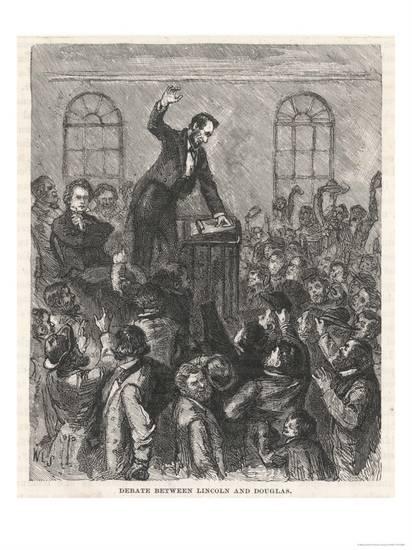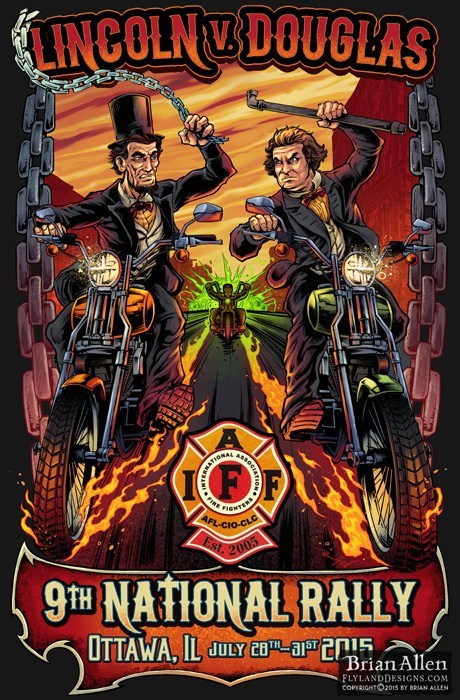Debate vs. Fight: Notes in the Lead-Up to "the Debate of the Century"
by Tess Crain
Friday night, in Toronto, Slovenian philosopher and analyst Slavoj Žižek will debate Canadian psychologist Jordan Peterson on the topic of “Happiness: Capitalism vs. Marxism,” with Stephen Blackwood moderating.
The internet (including Twitter, Toronto Life, the Chronicle, and the Stranger) has a lot to say, and the more you read, the more the debate seems like a title fight or crossover smackdown: it’s the “debate of the century,” a “philoso-fight”; Peterson “wants to throw. The eff. Down”; Žižek will “verbally curbstomp” Peterson—basically, something between Muhammad Ali vs. Joe Frazier III, Floyd Mayweather, Jr. vs. Conor McGregor, and Alien vs. Predator. Just with words.
At its root, debate is combative. The word originates from “to fight” in Latin, having evolved via Old French and Middle English. Terms develop, however, as their societies do; “modern” debating is, but is not only, fighting.
As Joyce Carol Oates writes in her brilliant On Boxing: “‘boxing’ and ‘fighting,’ though always combined in the greatest of boxers, can be entirely different and even unrelated activities. If boxing is frequently… a highly complex and refined skill, belonging solely to civilization, fighting belongs to something predating civilization, the instinct not merely to defend oneself… but to attack another and to force him into absolute submission.”
Using this model, an exemplary “debate” is that between Noam Chomsky and Michel Foucault in 1971, moderated by Dutchman Fons Elders as part of his series Philosophical Debates. Chomsky, Elders, and the audience speak in English; Foucault, apologizing for his poor fluency, switches to French. Described by Elders as two “tunnelers working at opposite sides of the same mountain with different tools, without even knowing if they are working in each other’s direction,” the thinkers discuss human nature, “the philosophical and theoretical, as well as the political questions of the debate.” At one point, Foucault, visibly restraining himself, seems ready to knock his own teeth out with his pen in a fit of frustration while Chomsky talks. Whether the debaters shake hands afterward is unclear. Chomsky has written since that he was shocked by Foucault’s “amorality.” Nonetheless, to a viewer, the debate feels not only civil (thanks in part, perhaps, to Elders) but meaningful, in that knowledge seems to have moved between the two men and in its exchange produced something new.
“Fighting,” on the other hand, can be represented by the succession of debates, held during the Democratic and Republican national conventions, in 1968, between Gore Vidal and William F. Buckley—the most famous of which culminated in Vidal calling Buckley a “crypto-Nazi” and Buckley replying: “Now listen, you queer, stop calling me a crypto-Nazi or I’ll sock you in your goddamn face, and you’ll stay plastered.” The New York Times wrote that a documentary on the two, called “Best of Enemies,” proves that, “even… the most pedigreed and respected intellects could descend into name-calling and, for a moment, the threat of physical violence.” There is a thrill in this kind of intensity, just as the sight of blood can send a boxing crowd into a frenzy, but the sense of something gained—other than a point for Vidal—is absent.
The difference between “fighting” and “debate” is at once simple and elusive. There are too many degrees of freedom. The terms are neither synonymous nor separable. Still, there is a difference and, in difference, there is value. Although Chomsky and Foucault argued vehemently, their engagement seemed to live beyond competition, something absent in Vidal’s provocations and Buckley’s slurs—not in the sense of politesse, but rather intent: these are strategies for disarming or harming an opponent, not attempts at meaning. Buckley and Vidal are speaking to prove each other wrong, whereas Chomsky and Foucault are speaking, yes, to demonstrate their own rightness, but also to extrapolate an idea.
Unrelated, if not incidental, to his debate with Chomsky, Foucault has spoken about "events": “The history that bears and determines us has the form of a war rather than that of a language—relations of power, not relations of meaning. History has no ‘meaning,’ though this is not to say that it is absurd or incoherent. On the contrary, it is intelligible and should be susceptible to analysis down to the smallest detail—but this in accordance with the intelligibility of struggles, of strategies and tactics.” Both fights and debates seem naturally to constitute events. A debate, however, is an event plus meaning. The additional characteristic lies somewhere between the thirteenth century wherein to debate was to fight and “modern” usage, which may or may not still pertain.
Žižek debates Peterson Friday night. We’ll see (and discuss) whether it is a fight or a debate.
Post-event analysis, added 4/23:
For the first thirty minutes of Friday’s debate, while Jordan Peterson used his “opening statement” to critique The Communist Manifesto—“the original cause of all the trouble”—the evening seemed destined to be a “fight.” This changed as soon as Zizek took to the podium for his own half-hour introduction. Avoiding Marx entirely, he began by invoking his and Peterson’s shared marginalization by the “politically correct” agenda, then went on to critique capitalism and discuss China, climate change, and technology. Although apparently disoriented, at first, by his opponent’s saying little with which he might disagree, Peterson quickly embraced the dynamic, calling Zizek “charismatic and attractive” and openly smiling and nodding while the other man talked. As the Guardian noted: “The great surprise of this debate turned out to be how much in common [the two] had.” In his final remarks, Peterson said he hoped the debate had shown viewers that “people of goodwill, despite their differences, can communicate and can come out of that communication improved.”
The debate was not, then, a fight. Yet it was not exactly a debate, either. It felt less like watching an elite matchup—apparently boring in its subtlety—than a fixed one. Both Zizek and Peterson seemed complicit, if unconsciously, in their camaraderie.
There are various reasons why each might have chosen this rapport; what seems clear is that it was a choice. Neither man has been known to back down from an argument. While Peterson tends to keep his composure in person, he does not refrain from interrupting and talking over interlocutors. Zizek lacks both Peterson’s self-control and his rage, yet he loves to heckle and is hardly passive. The debate itself came out of a year-long feud.
Why, then, were they so chummy? Each may have wanted to poach supporters from the other’s fanbase, which excessive antagonism could have undermined. Perhaps, as suggested by Jacobin magazine, the “frenemies” “united against happiness,” mutually affirming “the existence of class society, social hierarchy, and the inescapable fate of suffering.” The Federalist credits “the humility and humanity of the philosophical fathers,” that is, Zizek and Peterson. Or maybe, as Now Toronto suggests, the two men formed an entente in “shared distaste for the puritanical fervour of modern ‘Social Justice Warriors’.”
This last strikes me as most salient, for one reason in particular: an absent presence Friday night was anyone not, to quote Zizek, “white, male, and all that stuff”—both debaters, the moderator, and even the audience, its questions communicated through Stephen Blackwood, were demographically matched. One can see how, with no Other voice to nettle their civility, Zizek and Peterson could seek an entente.
The topic of the debate was “happiness” and, despite sharing a reputation for discontent—and having agreed that happiness cannot constitute a primary objective (rather, it is a positive byproduct of something else)—at the end of the night, both Zizek and Peterson appeared to be quite happy. Consciously or not, that “something else” seems born of homogeneity.
Tess Crain is a graduate of the NYU Creative Writing Program, where she served as a Goldwater Fellow. Her writing has appeared in the New Republic. She lives in New York City.










